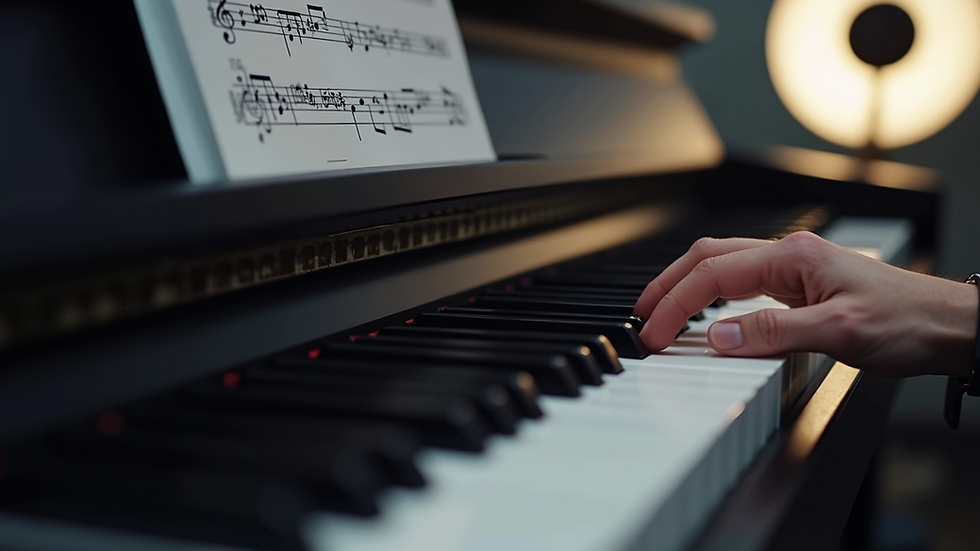Beginner’s Guide to Piano Lessons
- BROOKLYN MUSICALS
- Jun 23, 2025
- 4 min read
Learning to play the piano can be one of the most rewarding endeavors a person can undertake. Whether you are looking to play for leisure or aspire to perform before an audience, the journey begins with understanding the basics of piano lessons. In this beginner’s guide, we will explore everything you need to know to get started, including essential tips and resources for a successful learning experience.

Beginner Piano Classes
When starting your piano journey, finding the right class is crucial. Beginner piano classes typically focus on the foundational skills needed for playing. These classes often teach you about music theory, reading sheet music, and basic techniques for finger placement.
Many local music schools offer beginner piano classes, and partnering with a qualified instructor can make a significant difference in your learning experience. Online platforms are also available for those who prefer remote learning. Sites like Brooks Musicals provide valuable resources and classes specifically designed for beginners.
To begin, choose a class tailored to your skill level. This ensures that you learn at a comfortable pace and don’t become overwhelmed. The goal is to build a strong musical foundation from the ground up.

Choosing the Right Piano
Before starting your classes, it's essential to decide which type of piano you'll be using. There are generally three types: acoustic, digital, and hybrid. Each has its benefits and drawbacks.
Acoustic Pianos: These are traditional pianos with mechanical strings. They provide a rich and authentic sound but can be expensive and require regular tuning.
Digital Pianos: These are electronic instruments that mimic the sound of acoustic pianos. They can be more affordable, portable, and often come with built-in metronomes and various sound effects.
Hybrid Pianos: These combine features of both acoustic and digital pianos. They offer the authentic feel of real keys with the versatility of digital sounds.
Selecting the right piano depends on your budget, space, and personal preferences. Make sure to try different models and choose the one that feels comfortable for you.
What Age Is Too Late to Start Piano?
One common concern among prospective piano students is whether they are too old to start learning. The reality is that there is no age limit for learning to play the piano. Many successful musicians began their training later in life.
Research indicates that older adults can benefit from learning a musical instrument. Studies have shown that playing an instrument can improve cognitive function, memory, and even reduce stress levels. Thus, whether you are a child, a teenager, or an adult, starting piano lessons can be a fulfilling experience.
It's advisable to choose lessons designed for your age group for more effective learning. Younger students might enjoy classes that include fun activities, while adult learners might prefer a more structured approach that focuses on specific musical interests.

The Importance of Practice
One of the key components of mastering the piano is practice. Regular, focused practice improves muscle memory and helps reinforce the techniques learned during lessons. Here are some tips for establishing an effective practice routine:
Consistency is Key: Aim to practice a little every day, even if it’s just for 15-30 minutes. Consistency helps you retain what you’ve learned.
Set Clear Goals: Define what you want to achieve during each practice session. Whether it's mastering a scale or learning a new piece of music, having a goal keeps you focused.
Use a Metronome: This tool keeps your timing steady and helps you develop a strong sense of rhythm. Practicing with a metronome can drastically improve your playing.
Record Yourself: Listening to recordings of your practice sessions can provide insight into your progress. This feedback can help you identify areas for improvement.
Be Patient: Learning an instrument takes time. Celebrate small achievements to keep yourself motivated throughout the learning process.
By dedicating time and effort to practice, you’ll notice substantial improvements in your piano-playing skills over time.
Finding Your Musical Style
As you progress with your piano lessons, you may develop preferences for certain musical styles. From classical and jazz to pop and rock, exploring different genres can be exciting. Here are some suggestions for discovering your musical taste:
Try Various Genres: Experiment with different styles, from classical compositions to contemporary pop songs. This will help you find what resonates with you.
Listen Actively: Engage with music by focusing on piano performances that inspire you. Pay attention to how the piano complements the overall composition.
Take Inspiration from Artists: Study the work of famous pianists in your preferred genre. By analyzing their techniques, you can incorporate elements of their style into your own playing.
Join a Group: Taking part in community music groups or online forums allows you to share your experiences, learn from others, and find inspiration.
As you delve deeper into your musical journey, discovering your unique style will enhance your relationship with the piano and make your practice sessions more enjoyable.
In your pursuit of mastering the piano, remember that consistency and passion are the keys to success. By investing time to learn and explore your musical interests, you will find yourself continually improving and enjoying the beautiful art of music.

The Journey of Learning: Next Steps
Embarking on your piano-learning journey can be both exciting and daunting. However, by following the tips and guidelines outlined in this beginner's guide, you can set yourself up for success.
Start by exploring piano lessons specifically designed for beginners, just like those offered at Brooks Musicals. Tailoring your approach to suit your goals, whether for personal satisfaction or professional aspirations, will significantly enhance your learning experience.
Remember, the journey to becoming an accomplished pianist is unique for everyone. Embrace your progress, keep yourself motivated, and enjoy every note as you play. Happy practicing!


Comments